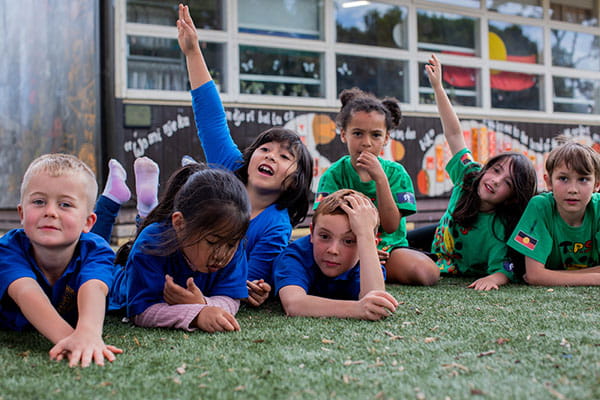Overview
Alignment with Be You Domains
-
Early Support
Alignment with Early Years Learning Framework (EYLF)
- Children are confident and involved learners
- Children have a strong sense of identity
- Children have a strong sense of wellbeing
Alignment with Australian Curriculum
- Health and PE
Target audience
- Early learning
- Primary school
Target groups
- Individual
- Small group
- Whole class
Aims
Animal Fun is designed to promote the motor skills and social skills of young children. Based on imitating animal movements, activities have been designed by physiotherapists, occupational therapists and psychologists to allow children to develop their skills in a fun and engaging way.Program theory
The program uses the environmental stress hypothesis (ESH) to understand the relationship between poor movement skills and the associated increased risk for mental health issues and conditions.Topics
Gross motor skill development: trunk, upper and lower limbs, locomotion, sequencing, balance and core strength. Fine motor skills development: building upper limb strength, fine motor control, motor planning, pre-writing, pre-cutting skills. Social and emotional wellbeing: self-regulation skills, using laughter to relieve stress, identification of various emotions and recognising these in facial expression and body language.Cost
Program structure
There are 9 modules in the program, designed to be flexible and embedded into the child's everyday routines and rituals. Structured sessions can be programmed into the daily curriculum.Instructor
- Educator
Instructor training
A 1.5-hour interactive workshop is available at an additional cost to support educators to implement the program. Resources are additional to the cost of participating in the workshop but can be viewed during the workshop.Supporting resources or materials available with program
- Manual
- Posters
Other materials
N/AOngoing support
Ongoing phone or email support. Follow-up visits are included in some of the larger program packages or schools can ask for follow-up visits on an ad hoc basis.Parent involvement
- Attend information sessions
- Written information provided to parents
Origin of program
Australia
Curtin University
Program authors
Emeritus Professor Jan Piek, Professor Leon Straker, Dr Lynn Jensen, Professor Tanya Packer, Dr Alma Dender, Associate Professor Clare Roberts, Associate Professor Rosanna Rooney, Sue McLaren
Ratings
Summary of evidence factors
This is a summary of the evaluation or research study characteristics that contribute to the program’s evidence rating.
|
Positive impact on at least one outcome for children and/or young people?
The study reported positive outcomes. |
Yes |
|---|---|
|
Link between program description and theory of change
Theory of change refers to whether there was a comprehensive description and illustration of how and why a desired change is expected to happen in a particular context. |
Comprehensive |
|
Study design
Type of study design reported. |
Randomised control trial |
|
Independence
The degree to which the program authors were involved in the research. |
Semi |
Summary of implementation factors
This is a summary of the program’s characteristics that contribute to its implementation rating.
|
Feedback sought from participants
Participants enjoyed the program and understood its benefits. |
Yes |
|---|---|
|
Feedback sought from instructors
Instructors enjoyed the program and understood its benefits. |
Yes |
|
Groups program is not suitable for
Groups the program wouldn't be suitable for or that required further research to determine suitability. |
Not assessed |
|
Training provided during study
The model of training provided. |
Face to face, all instructors, in person |
|
Ongoing instructor support provided during study
Whether ongoing support is provided. |
Yes |
Context
This is a summary of the context in which the evidence for the program was established.
|
Study Participants
Pre school, primary school (Foundation to Year 6), secondary school (Years 7 to 12). |
Early learning |
|---|---|
|
Country of Study/s
The location in which the evidence or research was conducted. |
Australia |
|
Location of Study/s in Australia
The state (or states) the program was assessed in Australia. |
WA |
|
Evaluation of program in culturally and linguistically diverse populations
Provider has included culturally and linguistically diverse people when assessing the program. |
Yes |
|
Evaluation of program in Aboriginal and Torres Strait Islander children and young people
Provider has included Aboriginal and Torres Strait Islander peoples when assessing the program. |
Yes |
|
Evaluation of program in low socioeconomic groups
Program has evaluated a diverse socio-economic population in their research. |
Yes |
|
Developmental based adaptations to program design and delivery
Shorter sessions for younger students or activities are adjusted for age appropriateness. |
Yes |
|
Evaluation of program in children and young people with disability and/or learning difference
Provider has included participants with a disability or learning difference when assessing the program. |
Yes |
Last updated: 31 May 2023
